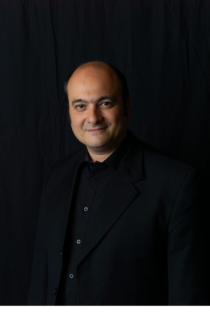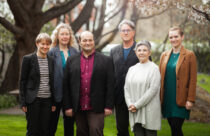Christ Church Cathedral
Subscriptions: To purchase tickets to this performance as part of a subscription to 3 or more concerts and receive a 25% discount off the full ticket price, please call Early Music Vancouver’s box office at 604-732-1610 or email boxoffice@earlymusic.bc.
Artists: Contrasto Armonico
Born in 1668, François Couperin was the only son of Charles Couperin, the harpsichordist and organist at the old Parisian Church of Saint-Gervais. During his lifetime, François Couperin, the most illustrious member of a distinguished musical family, was highly esteemed, both as performer (on the organ and the harpsichord), and as composer, and it was his contemporaries who conferred upon him the surname of “The Great.”
Les Nations is a vast project of extended trio sonatas in which the virtues of both the French and Italian styles are set next to each other. Each of the four Ordres celebrates a Catholic power of Europe, France, Spain, the Holy Roman Empire and the Savoy dynasty of Piedmont, and each is a combination of an Italianate trio sonata with its free-form virtuosity and a large-scale and elaborate French dance suite.
Although the collection was published in 1726, some of the pieces were composed by Couperin some thirty or more years earlier, inspired by his enthusiasm for the newly-discovered Italian instrumental style, like many other composers of his generation.
This concert is generously supported by an Anonymous Donor & Bob and Jo Anne Tharalson.
Pre-concert talk: Join us at 6:45 p.m. for a pre-concert interview with Christina Hutten and Marco Vitale, director of Contrasto Armonico. This talk is included in the live concert ticket price.
PURCHASING TICKETS
Click here to purchase tickets.
Subscriptions: To purchase tickets to this performance as part of a subscription to 3 or more concerts and receive a 25% discount off the full ticket price, please call Early Music Vancouver’s box office at 604-732-1610 or email boxoffice@earlymusic.bc.
PROGRAMME
François Couperin (1668-1733)
L’Impériale
Sonade
Gravement
Vivement
Gravement, et marqué
Légérement
Rondement
Vivement
Allemande
Courante
Seconde Courante
Sarabande
Bourée
Gigue
Rondeau
Chaconne
Menuet
L’Espagnole
Sonade
Gravement, et mesuré
Vivement
Air. Affectueusement
Légérement – Gayement
Air tendre
Vivement, et marqué
Allemande
Courante
Seconde Courante
Sarabande
Gigue Lourée
Gavotte
Rondeau
Bourée & Double de la Bourée Précédente
Passacaille
Gigue Lourée
Gavotte
Rondeau
Bourée & Double de la Bourée Précédente
Passacaille
PROGRAMME NOTES
Born in 1668, François Couperin was the only son of Charles Couperin, the harpsichordist and organist at the old Parisian Church of Saint-Gervais. During his lifetime, François Couperin, the most illustrious member of a distinguished musical family, was highly esteemed, both as performer (on the organ and the harpsichord), and as composer, and it was his contemporaries who conferred upon him the surname of “The Great”.
Les Nations is a vast project of extended trio sonatas in which the virtues of both the French and Italian styles are set next to each other. Each of the four ordres celebrates a Catholic power of Europe, France, Spain, the Holy Roman Empire and the Savoy dynasty of Piedmont, and each is a combination of an Italianate trio sonata with its free-form virtuosity and a large-scale and elaborate French dance suite.
Although the collection was published in 1726, some of the pieces were composed by Couperin some thirty or more years earlier, moved by his enthusiasm for the newly-discovered Italian instrumental style, like many other composers of his generation in France.
In the preface of Les Nations he explains:
“It is a few years now since one part of these trios was composed; a few manuscripts of them were distributed about, but I have little faith in them because of the negligence of the copyists. From time to time I have added to their number, and I believe that lovers of the true will find them to their liking. The first sonata in this collection is also the first that I composed and the first of its kind to be composed in France. It has quite a singular story. Charmed by the sonatas of Signor Corelli and by the French works of M. de Lulli, both of whose compositions I shall love as long as I live, I ventured to compose a sonata myself which I arranged to have played by the same group as I had heard play Corelli’s. Knowing how keen the French are on foreign novelties in all matters, and lacking confidence in myself, I did myself a favour through an inoffensive stratagem. I pretended that a relative of mind that I actually do have and who is attached to the court of the King of Sardinia, had sent me a sonata by a new Italian composer. I arranged the letters of my name so as to form an Italian name which I gave instead. The sonata was received with much acclaim and I will say nothing further in its defence. I wrote others and my sonatas enjoyed sufficient favour for me not to blush at my subterfuge.”
There is evidence which suggest that some of these early works which found their way into Les Nations were composed in the early 1690s, about eleven years after the appearance of Corelli’s first set of trio sonatas of 1681. Couperin’s autograph manuscript of the works is lost and therefore we can only guess his Italian anagram which would have appeared on the title-page. Two copies of three of the four sonatas have survived under the titles of La Pucelle, La Visionnaire and L’Astrée: names which were changed when Couperin revised and published them later in Les Nations.
Couperin’s Nations were published in 1726 by Boyvin, and they are printed in separate parts, Premier dessus, Second dessus (first and second top parts), Basse d’archet (bowed bass) and Basse chifrée (figured bass). His deep affection to the viola da gamba helped to maintain the status of this instrument in France, long after they had surrendered to the violin and cello elsewhere.
Contrasto Armonico will perform two of the ordres, L’Impériale and L’Espagnole, adding wind instruments (traverso, oboe and bassoon) as is customary with Couperin’s music.

Marco Vitale, dir., harpsichord
Marco Vitale was born in Palermo, Italy. After finishing studies in his hometown, he attended the Royal Conservatoire in The Hague where he studied harpsichord with Ton Koopman and organ with Jos van der Kooy, graduating with a master’s degree in Early Music. Throughout his career Marco has performed at the most prestigious venues and festivals throughout Europe, the USA, Canada, South America, the Middle East and Asia, such as Château de Versailles spectacles, Philharmonie de Paris, Salle Pleyel Paris, Ambronay Festival, Grand Théâtre de Bordeaux, Oude Muziek Utrecht, Concertgebouw Amsterdam, L’Auditori in Barcelona, Styriarte Festival in Graz, Misteria Paschalia Kraków, National Music Forum Wroclaw, KKL Luzern, Roma Festival Barocco, Echi Lontani in Cagliari, Teatro Ristori di Verona, Philharmonie Luxembourg, Lincoln Center and Carnegie Hall in New York, Seoul Arts Center, USACH festival in Santiago de Chile, Gran Teatro Nacional de Lima (Peru), Teatro Metropolitano José Gutiérrez Gómez in Medellin (Colombia), Teatro Mayor “Julio Mario” de Bogotà (Colombia).
From 2008-2011 Marco Vitale worked at the Higher Institute of Music in Damascus, Syria, where he taught early music performance practice and performed concerts together with Syrian musicians.
He is the co-founder and musical director of Contrasto Armonico, an ensemble specializing in Baroque operas and the performance of music in the Italian style, using period instruments and historically informed performance practices. In 2012 he founded his own record label ayros, which features recordings by Contrasto Armonico and other artists. In a collaboration with ayros, Marco is currently involved in recording the Complete Italian Cantatas by Handel, a thrilling project that will bring to light many undiscovered jewels of Handel’s which have yet to be either edited or recorded. Marco has appeared on several radio and TV broadcasts, including the specialized music channel Mezzo.tv. In addition to ayros, he has recorded for Alia Vox, Naïve, and Brilliant Classics.
Mr. Vitale appeared as a guest conductor of the Warsaw Chamber Opera between 2015 and 2017, performing a variety of repertoire from Monteverdi madrigals to Mozart symphonies. In 2016-2017 he revived the opera Semiramide riconosciuta by Leonardo Vinci, conducting from the harpsichord at the Baroque Opera festival in Warsaw. This was the first time in three centuries that this opera had been performed.
In 2018 he composed Il ratto di Helena, an opera in 17th century style based on a libretto written by Virgilio Puccitelli (1636). The opera was commissioned by The Palace of the Grand Dukes of Lithuania, and performed in Vilnius in celebration of 100 years of Lithuanian independence.
Marco gives masterclasses in harpsichord and Early Music performance practice. He is the artistic director of the Arcadia Early Music Academy workshop in Poland and teaches at La Pellegrina s ummer school in the Czech Republic. He gives masterclasses, lectures and workshops at the Fryderyk Chopin University of Music in Warsaw, Fondazione Paolo Grassi in Martina Franca (Italy), ESMUC in Barcelona, the Higher Institute of Music in Damascus, and the University of Southern California in Los Angeles. Since 2017 Marco has been the music director of the Denman Baroque Workshop & Festival organized by Andrew Fyson and Robert Newton, which takes place every spring on Denman Island, British Columbia.

Contrasto Armonico
Contrasto Armonico is a leading orchestra/ensemble which focuses on early music, especially music composed in the Italian style. It was founded in The Netherlands, in 2004 by cellist Marta Semkiw and harpsichordist Marco Vitale (music director). The birth of the orchestra was celebrated in Delft (NL) with two productions of Handel operas: “Siroe, Re di Persia” and “Lotario”.
The aim of Contrasto Armonico is to go back to the roots of the HIP “Historically Inspired Performance”, doing front-line research and advancing the boundaries of early music performance practice. An idea of HIP as a constant “work in progress”, considering it as a philosophy instead of a consolidated tradition.
The ensemble is constituted of professional musicians from all over the world who share the same ideals and feelings for the Early Music performance practice, using copies of original instruments, historical pitches and transpositions, keeping as a goal the intention to get as close as possible to the style and aesthetic of the work performed.
Contrasto Armonico started a recording project of Handel vocal works in Italian language; the first CD was released in 2008 by Brilliant Classics, with the serenata “Aci, Galatea e Polifemo” followed by the oratorio “La Resurrezione” in April 2009. Contrasto Armonico is currently involved in recording the complete Italian cantatas by G. F. Handel, an ambitious project which will include all the cantatas in Italian language composed by Handel with instrumental accompaniment as well as with solo basso continuo (nearly 100 compositions): the first two volumes were released in the Handel year 2009.
Contrasto Armonico has performed in prestigious concert halls and festivals such as Concertgebouw Amsterdam, Utrecht Early Music Festival and Styriarte Graz.
In September 2021 its music director Marco Vitale moved to Victoria, BC and in April 2022 the Contrasto Armonico Music Society was incorporated in Canada. The ensemble is now based in Victoria, performing with both local BC musicians as well as international artists.


